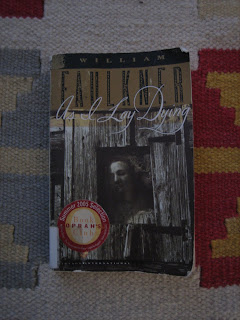 I love that a banned or challenged book can also be an Oprah's Book Club selection, and furthermore such an endorsed edition would be in the library. Her reach is long, and, no matter you're feelings about the wielding of such power to make-or-break a book, girl can get people reading!
I love that a banned or challenged book can also be an Oprah's Book Club selection, and furthermore such an endorsed edition would be in the library. Her reach is long, and, no matter you're feelings about the wielding of such power to make-or-break a book, girl can get people reading!William Faulkner's As I Lay Dying, published in 1930, follows the death of Addie Bundren and the trials experienced by her neer-do-well husband and their five children to bring her body tobe buried in Jefferson, a distant town from their farm in Faulkner's fictional Yoknapatawpha County, Mississippi.
The book follows the stream of consciousness point of view of 15 different narrators in 59 chapters, the shortest of which is only five words long. As the reader you piece together the plot and the characters through the eyes of the others. Wonderful, if sometimes puzzling.
According to the Wikipedia list, As I Lay Dying was banned in Kentucky for language and for being anti-Christian. I suppose anti-Christian covers an extramarital affair with a preacher, premarital sex, abortion, lying, desecration of a body, or taking the Lord's name in vain. Maybe that last one was covered by language. I suppose my favorite detail is the widower Anse Bundren, failing to spend any money for the benefit of his dying then dead wife or his children, getting fitted for new teeth and remarrying as soon as Addie is in the ground. Maybe that's anti-Christian, too.
I suppose, as banned books go, As I Lay Dying is sitting pretty. It does not appear on any contemporary banned book list; Faulkner received the Nobel Prize for Literature in 1949, and later two Pulitzer's and two National Book Awards. And unlike other required reading for students, again Faulkner has not been banned or challenged frequently enough to make any contemporary lists. As I Lay Dying seems to be a good example of the changing and fickle tastes in challenging books. The ban does not seem to have spread beyond Kentucky, yet I wonder if frequency and availability become the lightning rods for challenging books in our contemporary era. As we will see shortly, it seems that popular books often aimed at children draw the most attention on the more current banned book lists.
Up next: Scary Stories Series by Alvin Schwartz